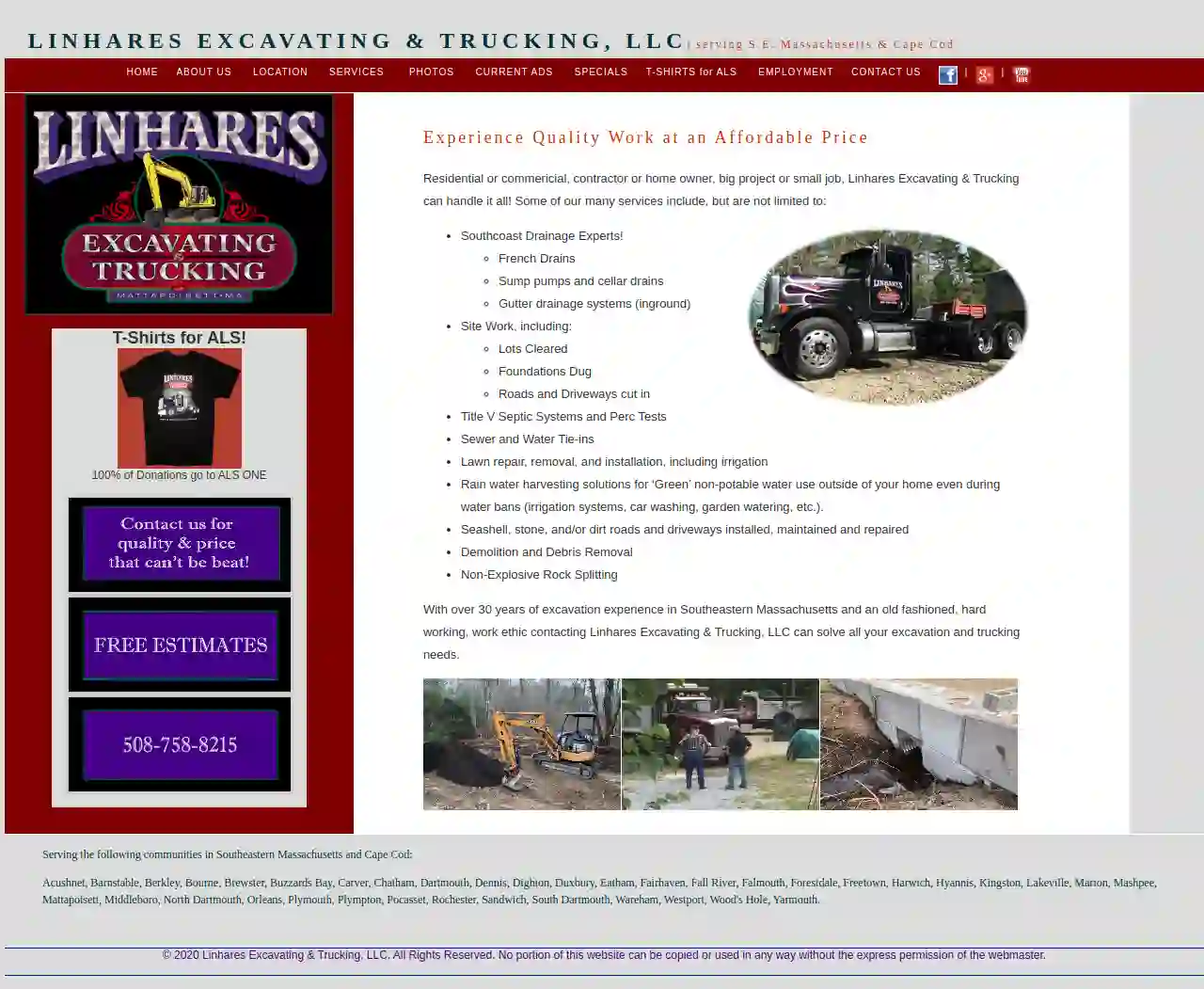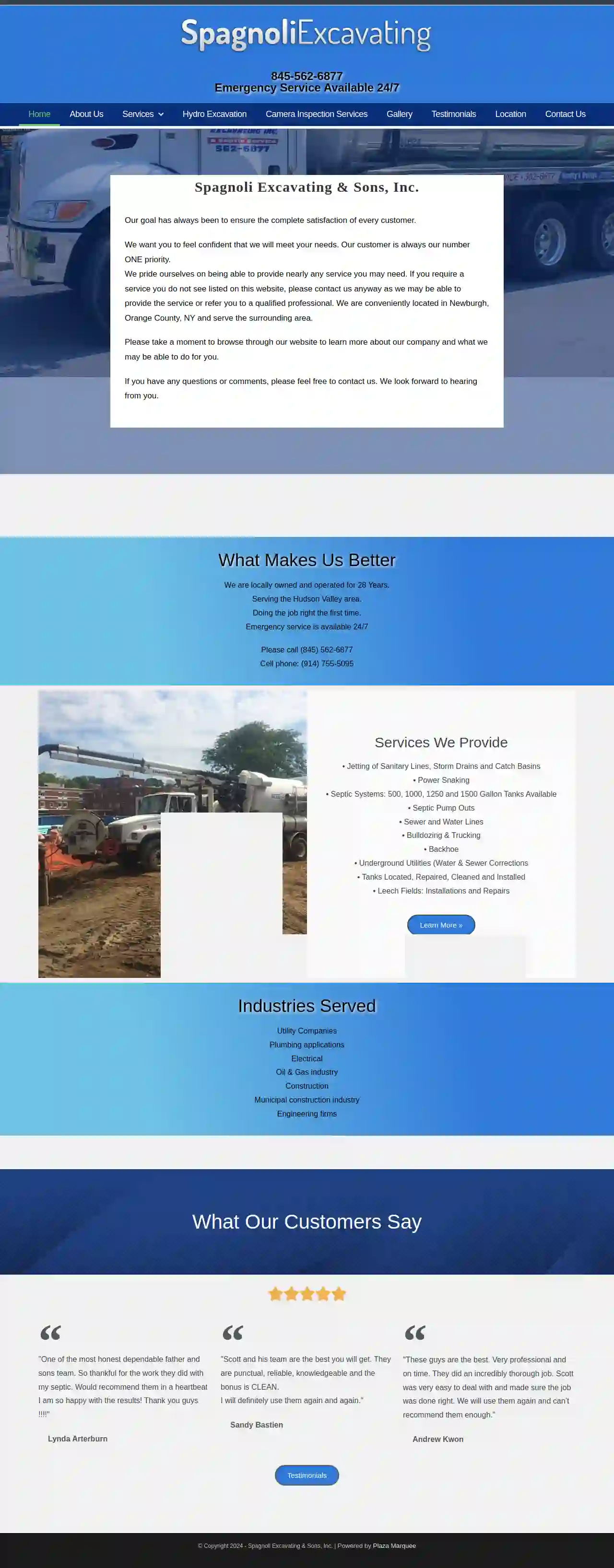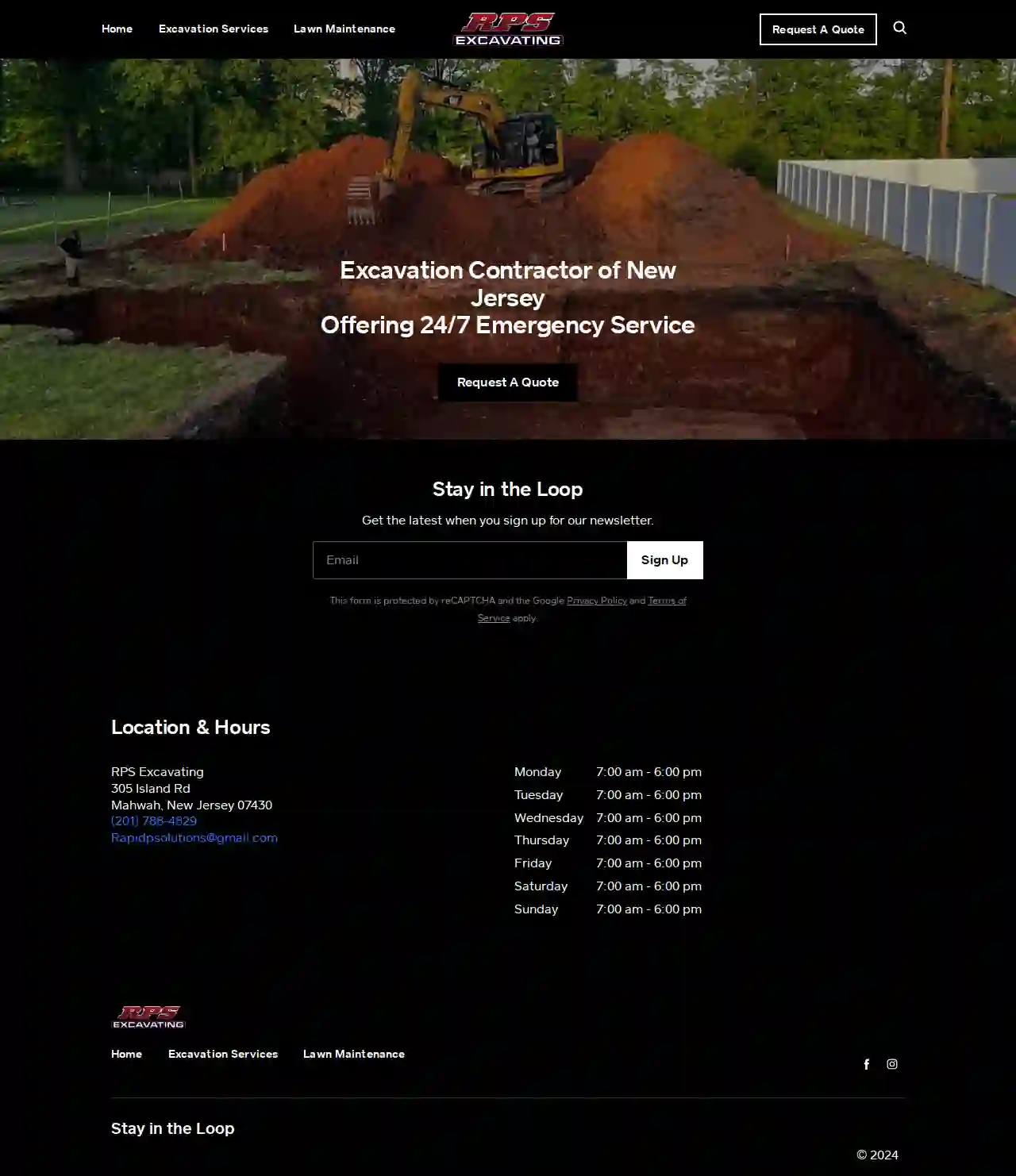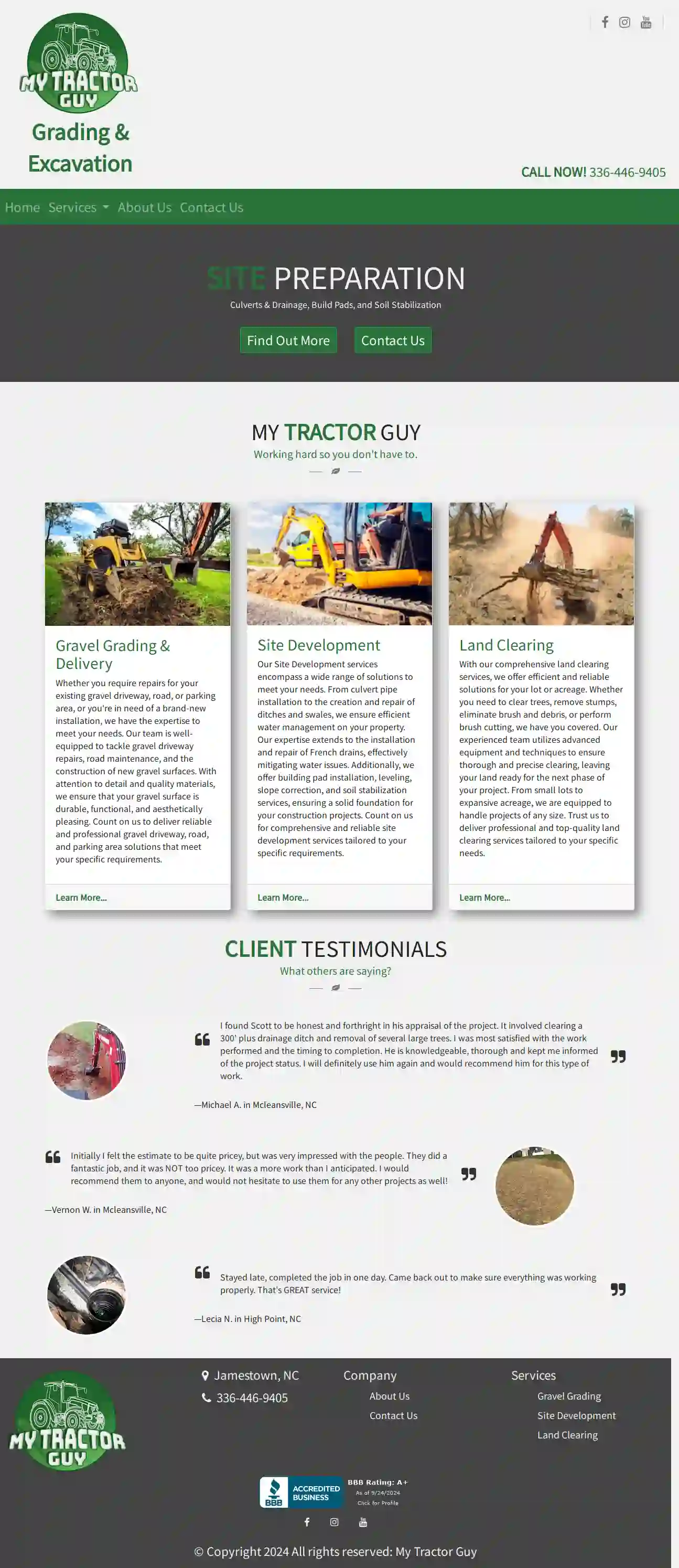Excavation Contractors Stillwater
Best Excavating Contractor in Stillwater
Get multiple Excavation Companies quotes for your project today! Compare profiles, reviews, accreditations, portfolio, etc... and choose the best service.

Buraq Construction Inc
571 reviews1307 Foster Ave, Brooklyn, 11230, USAbout Us Buraq Construction Company was established to offer general construction business in New York City, and has been giving excellent service for more than 10 years. We are the specialists in luxury construction services of the highest standard and safety while keeping up the same standards and quality. Our experienced team is well-versed in navigating the complexities of city regulations and addressing violations efficiently and effectively.
- Services
- Why Us?
- Gallery
Get Quote
Linhares Excavating & Trucking, LLC
52 reviewsMattapoisett, USLinhares Excavating & Trucking, LLC: Your Trusted Partner for Excavation and Trucking Needs in Southeastern Massachusetts and Cape Cod For over 30 years, Linhares Excavating & Trucking, LLC has been a leading provider of excavation and trucking services in Southeastern Massachusetts and Cape Cod. We are a family-owned and operated business with a strong commitment to quality, customer satisfaction, and a dedication to providing our clients with the best possible experience. Whether you're a homeowner, contractor, or business owner, we have the expertise and resources to handle any project, big or small. Our team of experienced professionals is dedicated to providing you with the highest quality workmanship and exceptional customer service. We understand that your project is important to you, and we're committed to working with you every step of the way to ensure your complete satisfaction. We take pride in our commitment to safety and environmental responsibility. We use the latest equipment and techniques to ensure that all our projects are completed on time and within budget, while minimizing our impact on the environment. Contact us today for a free estimate and let us show you why Linhares Excavating & Trucking, LLC is the right choice for all your excavation and trucking needs.
- Services
- Why Us?
- Gallery
Get Quote
MUX Construction INC
578 reviewsBrooklyn, USMUX Construction Inc. Are you looking for a licensed and experienced professional construction company to tackle your project? Get guaranteed quality results with MUX CONSTRUCTION INC. We offer professional and reliable services for a wide variety of needs, working with the dedication and craftsmanship that has earned us a reputation for excellence. Get in touch for a free quote today. MUX CONSTRUCTION INC is well known as an experienced and professional Brooklyn N.Y based Construction Company. We provided clients with top of the line Construction services that cater to their specific project needs and management requirements, and all at the most competitive rates. Contact us today and find out how we can help. MUX Construction Inc. is fully licensed and insured , our services meet all standards of safety and quality. We refuse to use low quality material on any of our Jobs. We invest in keeping our clients safe through sturdy constructions that will last a lifetime. MUX Construction Inc. has 35 Years of Hands on experience in all types of Construction work, using respected equipment brands and trusted material providers. We offer the best quality of work at the best prices. Satisfaction Guaranteed If you're in need of Renovations for your commercial space or in need of Local Law 11 Inspection consider working with MUX Construction. For each of our services we have experienced professionals that will handle your project with detail and care. Let us know what you want, we’ll do our best to make it happen. As a professional Contractor I and my talented team at MUX Construction only work with the best materials. We produce consistent results and offer reliable work ethics on every project. Everything we work on is built on a strong foundation, which means it’s built to last.
- Services
- Why Us?
- Testimonials
- Gallery
Get Quote
Spagnoli Excavating Inc
517 reviews47 South Plank Road, Newburgh, 12550, USSpagnoli Excavating & Sons, Inc. At Spagnoli Excavating & Sons, Inc., our unwavering commitment is to ensure the complete satisfaction of every customer. We strive to provide you with the confidence that your needs will be met, placing our customers as our top priority. We take pride in offering a wide range of services to cater to your diverse requirements. If you need a service not listed on our website, don't hesitate to contact us. We may be able to assist you or refer you to a qualified professional. Conveniently located in Newburgh, Orange County, NY, we serve the surrounding area. Explore our website to learn more about our company and the services we can provide. Feel free to reach out with any questions or comments. We look forward to hearing from you.
- Services
- Why Us?
- Testimonials
- Gallery
Get Quote
RPS Excavating
518 reviews10000 County Rd 12, Seaforth, N0L 1P0, USAbout RPS Excavating RPS Excavating is a family-owned and operated business with over 20 years of experience in the excavating industry. We are committed to providing our clients with high-quality services at competitive prices. We specialize in a wide range of excavating services, including: Site preparation Grading Demolition Utility installation Drainage And more! We are fully licensed and insured, and we have a team of experienced and qualified professionals who are dedicated to providing our clients with the best possible service. We are committed to safety and environmental responsibility, and we always strive to exceed our clients' expectations. Contact us today for a free estimate!
- Services
- Why Us?
Get Quote
My Tractor Guy Grading & Excavation
517 reviewsClay, USGravel Grading & Delivery Whether you require repairs for your existing gravel driveway, road, or parking area, or you're in need of a brand-new installation, we have the expertise to meet your needs. Our team is well-equipped to tackle gravel driveway repairs, road maintenance, and the construction of new gravel surfaces. With attention to detail and quality materials, we ensure that your gravel surface is durable, functional, and aesthetically pleasing. Count on us to deliver reliable and professional gravel driveway, road, and parking area solutions that meet your specific requirements. Site Development Our Site Development services encompass a wide range of solutions to meet your needs. From culvert pipe installation to the creation and repair of ditches and swales, we ensure efficient water management on your property. Our expertise extends to the installation and repair of French drains, effectively mitigating water issues. Additionally, we offer building pad installation, leveling, slope correction, and soil stabilization services, ensuring a solid foundation for your construction projects. Count on us for comprehensive and reliable site development services tailored to your specific requirements. Land Clearing With our comprehensive land clearing services, we offer efficient and reliable solutions for your lot or acreage. Whether you need to clear trees, remove stumps, eliminate brush and debris, or perform brush cutting, we have you covered. Our experienced team utilizes advanced equipment and techniques to ensure thorough and precise clearing, leaving your land ready for the next phase of your project. From small lots to expansive acreage, we are equipped to handle projects of any size. Trust us to deliver professional and top-quality land clearing services tailored to your specific needs.
- Services
- Why Us?
- Testimonials
- Gallery
Get Quote
Quiver League
531 reviews381 South 5th Street, Brooklyn, NY, 11211, USAbout Quiver League Quiver League is at the forefront of revolutionizing the construction and land surveying industry. With a commitment to excellence and innovation, we specialize in monitoring the stability of adjacent structures during Demolition, Support of Excavation ( SOE), and foundation work, along with delivering comprehensive Land Surveying services. What makes Quiver Unique? Quiver League distinguishes itself within the New York City construction industry by leveraging innovative custom software systems. These cutting-edge tools empower both our field and office teams, facilitating the completion of projects at an unprecedented pace—far surpassing the capabilities of our competitors. Our distinctive software not only ensures efficiency but also prevents overwhelm, enabling us to seamlessly manage even the most demanding workloads. Moreover, it allows us to initiate new projects and field installations with remarkable agility, responding promptly to our client's needs, even on short notice.
- Services
- Why Us?
- Testimonials
- Gallery
Get Quote
Kings of Hope Excavation
58 reviewsCharleston, SC, 29401, USStart Your Construction Project Off the Right Way Get everything ready with land clearing services in Charleston, SC. Receive the Royal Treatment From Our Experts Rely on us for detailed excavation services in Charleston, SC. When it comes to improving your property, the possibilities are endless. And the team at Kings of Hope Excavation can help you accomplish your goals. We have over 10 years of experience completing grading and land clearing services in the Charleston, SC area. You can trust us to remove trees, clear away brush or grade your property before you start your construction project. We travel up to 60 miles outside of Charleston, SC to provide free estimates. Contact us today to book an estimate for our excavation services. You need a helping hand, and we're ready to step up. Call us to improve your property with: Land clearing services Excavation services Grading solutions Outdoor plumbing repairs Speak with one of our experts today when you call 843-364-9468. We're ready to improve your landscape with tree removal services Our company stands out from the rest because we're dad-operated and support a nonprofit for single dads. You'll receive high-quality results and the satisfaction that comes with providing work for diligent fathers. Fill out the form on our Contact Us page to schedule our team. Determine whether our services are right for you Wondering whether our excavation services are right for you? There are a few ways to tell. If you need a helping hand: Making room for your new construction or property improvement project, schedule land clearing services Installing or fixing underground utilities on your construction site, reach out to us for trenching services Flattening your land for a foundation installation or sloping it to prevent flooding, request land grading services With over a decade of experience under our belt, we're prepared to provide anything from trenching to land clearing services in Charleston, SC. For more information about our excavation services, reach out to a member of our staff ASAP.
- Services
- Why Us?
- Gallery
Get Quote
Snead's Outdoor Services LLC
4.713 reviewsLexington, NC, 27292, USWelcome to Snead’s Outdoor Services! With our background in landscaping and machinery, you can count on us to get the job done right! Our vision, our solutions, and our services are all here to help our clients. We offer an array of services with different options to execute each job. We take great pride in the work we do. Our vision is to provide our customers with the peace of mind that they are in good hands with our outdoor experts. Each new project we come across is different from the last. With the equipment and knowledge we possess of our industry, we are able to offer our customers a solution for every project, big or small. We always find a way to complete the job!
- Services
- Why Us?
- Testimonials
- Gallery
Get Quote
L and M Excavation
52 reviewsClay, USL & M Excavation is a locally owned business, operated by veterans who take pride in the work they do. We constantly stay up to date with the latest equipment and techniques, ensuring that every job is completed safely and efficiently. We specialize in a wide range of land clearing and excavation services. We always deliver the highest quality workmanship and customer service. For a free quote, please contact us today. We are available to answer any questions you may have and are eager to assist you with your project.
- Services
- Why Us?
- Gallery
Get Quote
Over 22,076+ Excavation Businesses on our directory
Our excavation contractors operate in Stillwater & surrounding areas!
ExcavationHQ has curated and vetted the Best Excavation Contractors arround Stillwater. Find a reliable pro today.
Frequently Asked Questions About Excavation Contractors
- Utility Locates: Contact your utility companies to mark the locations of underground lines before excavation begins. This is usually a free service.
- Hand Digging: Excavate carefully by hand near marked utility lines to avoid damage.
- Potholing: Digging small test holes to expose and verify utility depths and locations.
- Safe Distances: Maintaining a safe distance between excavation equipment and marked utility lines.
- Vacuum Excavation: Using vacuum excavation techniques to expose utilities without digging, reducing the risk of damage.
- Project Size and Scope: Larger, more complex excavations naturally take longer.
- Soil Conditions: Rocky or challenging soil types can slow down progress.
- Site Accessibility: Limited access might require more time for maneuvering equipment and hauling materials.
- Weather: Inclement weather can cause delays.
- Permitting and Inspections: Waiting for permits or inspections can extend the timeline.
- Soil Type and Stability: Stable, cohesive soils allow for deeper excavations than loose or unstable soils.
- Groundwater Level: Excavations below the water table require dewatering techniques to manage water intrusion.
- Equipment and Resources: The size and capabilities of excavation equipment influence the achievable depth.
- Safety Regulations: OSHA and other safety regulations impose limitations on trench depths without proper shoring or sloping.
- Project Requirements: The purpose of the excavation (basement, pool, foundation) determines the necessary depth.
How do you protect utilities during excavation?
How long does an excavation project take?
How deep can you excavate?
What is the difference between cut and fill excavation?
Cut: Involves excavating soil from an area where the existing grade is higher than the desired grade.
Fill: Refers to using the excavated soil ('cut' material) to raise the grade in an area where the existing grade is lower than desired.
This method minimizes the need to import or export soil, reducing costs and environmental impact. It's commonly used for site preparation, road construction, and landscaping.
How do you protect utilities during excavation?
- Utility Locates: Contact your utility companies to mark the locations of underground lines before excavation begins. This is usually a free service.
- Hand Digging: Excavate carefully by hand near marked utility lines to avoid damage.
- Potholing: Digging small test holes to expose and verify utility depths and locations.
- Safe Distances: Maintaining a safe distance between excavation equipment and marked utility lines.
- Vacuum Excavation: Using vacuum excavation techniques to expose utilities without digging, reducing the risk of damage.
How long does an excavation project take?
- Project Size and Scope: Larger, more complex excavations naturally take longer.
- Soil Conditions: Rocky or challenging soil types can slow down progress.
- Site Accessibility: Limited access might require more time for maneuvering equipment and hauling materials.
- Weather: Inclement weather can cause delays.
- Permitting and Inspections: Waiting for permits or inspections can extend the timeline.
How deep can you excavate?
- Soil Type and Stability: Stable, cohesive soils allow for deeper excavations than loose or unstable soils.
- Groundwater Level: Excavations below the water table require dewatering techniques to manage water intrusion.
- Equipment and Resources: The size and capabilities of excavation equipment influence the achievable depth.
- Safety Regulations: OSHA and other safety regulations impose limitations on trench depths without proper shoring or sloping.
- Project Requirements: The purpose of the excavation (basement, pool, foundation) determines the necessary depth.
What is the difference between cut and fill excavation?
Cut: Involves excavating soil from an area where the existing grade is higher than the desired grade.
Fill: Refers to using the excavated soil ('cut' material) to raise the grade in an area where the existing grade is lower than desired.
This method minimizes the need to import or export soil, reducing costs and environmental impact. It's commonly used for site preparation, road construction, and landscaping.